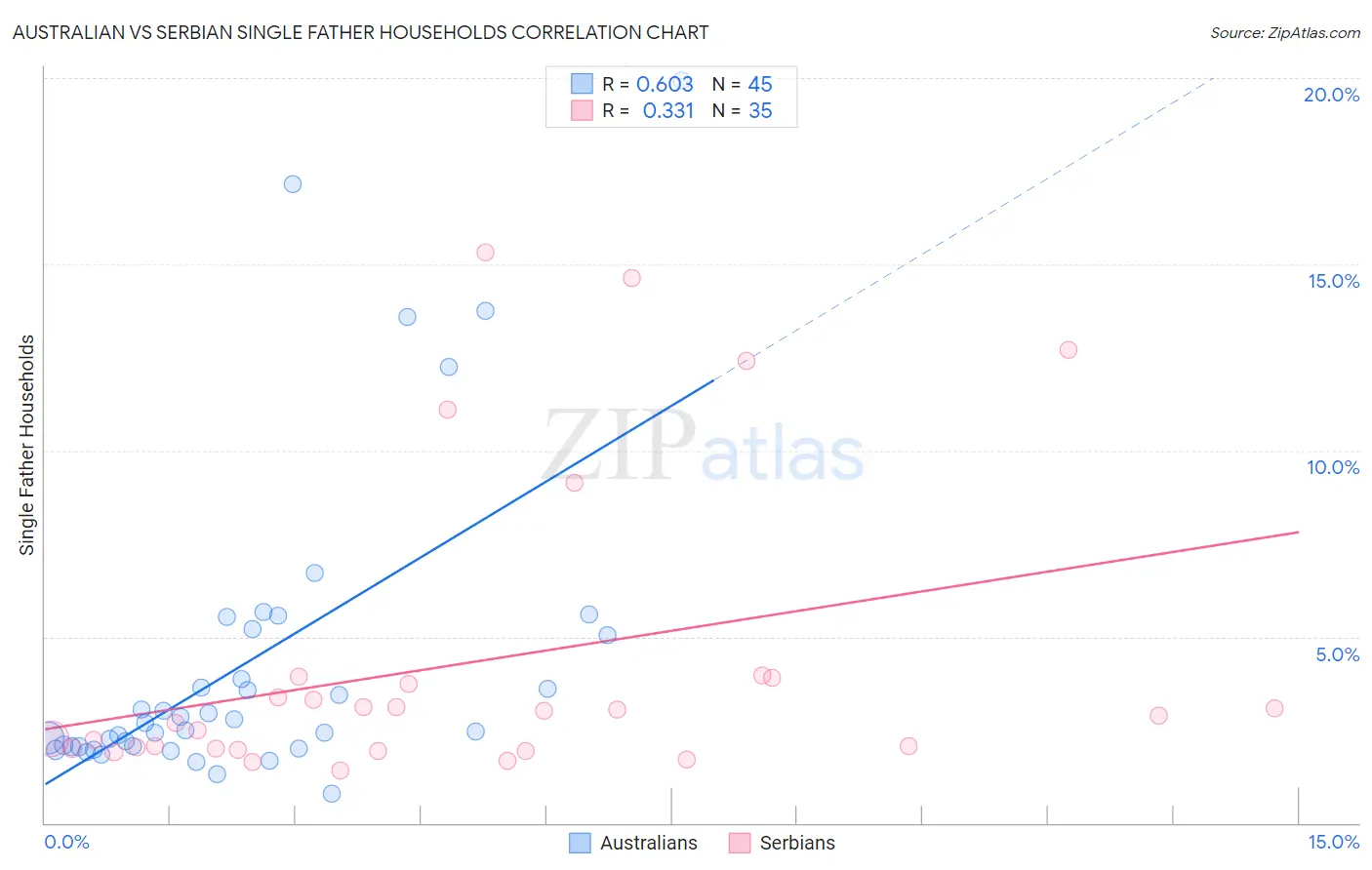Australian vs Serbian Single Father Households
COMPARE
Australian
Serbian
Single Father Households
Single Father Households Comparison
Australians
Serbians
2.2%
SINGLE FATHER HOUSEHOLDS
97.7/ 100
METRIC RATING
120th/ 347
METRIC RANK
2.2%
SINGLE FATHER HOUSEHOLDS
96.8/ 100
METRIC RATING
129th/ 347
METRIC RANK
Australian vs Serbian Single Father Households Correlation Chart
The statistical analysis conducted on geographies consisting of 222,691,289 people shows a significant positive correlation between the proportion of Australians and percentage of single father households in the United States with a correlation coefficient (R) of 0.603 and weighted average of 2.2%. Similarly, the statistical analysis conducted on geographies consisting of 265,770,289 people shows a mild positive correlation between the proportion of Serbians and percentage of single father households in the United States with a correlation coefficient (R) of 0.331 and weighted average of 2.2%, a difference of 0.69%.

Single Father Households Correlation Summary
| Measurement | Australian | Serbian |
| Minimum | 0.78% | 1.4% |
| Maximum | 19.9% | 15.3% |
| Range | 19.2% | 13.9% |
| Mean | 4.3% | 4.3% |
| Median | 2.7% | 2.9% |
| Interquartile 25% (IQ1) | 2.0% | 2.0% |
| Interquartile 75% (IQ3) | 5.1% | 3.9% |
| Interquartile Range (IQR) | 3.1% | 1.9% |
| Standard Deviation (Sample) | 4.3% | 4.0% |
| Standard Deviation (Population) | 4.2% | 3.9% |
Demographics Similar to Australians and Serbians by Single Father Households
In terms of single father households, the demographic groups most similar to Australians are Immigrants from Brazil (2.2%, a difference of 0.0%), Trinidadian and Tobagonian (2.2%, a difference of 0.030%), Immigrants from Morocco (2.2%, a difference of 0.090%), Immigrants from Iraq (2.2%, a difference of 0.10%), and Hungarian (2.2%, a difference of 0.19%). Similarly, the demographic groups most similar to Serbians are Immigrants from England (2.2%, a difference of 0.010%), Jordanian (2.2%, a difference of 0.050%), Moroccan (2.2%, a difference of 0.060%), Immigrants from Chile (2.2%, a difference of 0.11%), and Immigrants from Jordan (2.2%, a difference of 0.17%).
| Demographics | Rating | Rank | Single Father Households |
| Immigrants | North America | 98.2 /100 | #114 | Exceptional 2.2% |
| Immigrants | Barbados | 98.2 /100 | #115 | Exceptional 2.2% |
| Immigrants | Argentina | 98.1 /100 | #116 | Exceptional 2.2% |
| Hungarians | 97.9 /100 | #117 | Exceptional 2.2% |
| Immigrants | Morocco | 97.8 /100 | #118 | Exceptional 2.2% |
| Trinidadians and Tobagonians | 97.8 /100 | #119 | Exceptional 2.2% |
| Australians | 97.7 /100 | #120 | Exceptional 2.2% |
| Immigrants | Brazil | 97.7 /100 | #121 | Exceptional 2.2% |
| Immigrants | Iraq | 97.6 /100 | #122 | Exceptional 2.2% |
| Immigrants | Yemen | 97.5 /100 | #123 | Exceptional 2.2% |
| British West Indians | 97.4 /100 | #124 | Exceptional 2.2% |
| Immigrants | Indonesia | 97.4 /100 | #125 | Exceptional 2.2% |
| Moroccans | 96.9 /100 | #126 | Exceptional 2.2% |
| Jordanians | 96.9 /100 | #127 | Exceptional 2.2% |
| Immigrants | England | 96.8 /100 | #128 | Exceptional 2.2% |
| Serbians | 96.8 /100 | #129 | Exceptional 2.2% |
| Immigrants | Chile | 96.7 /100 | #130 | Exceptional 2.2% |
| Immigrants | Jordan | 96.6 /100 | #131 | Exceptional 2.2% |
| Poles | 96.5 /100 | #132 | Exceptional 2.2% |
| Taiwanese | 96.3 /100 | #133 | Exceptional 2.2% |
| Zimbabweans | 95.1 /100 | #134 | Exceptional 2.2% |